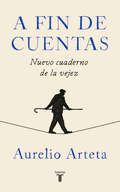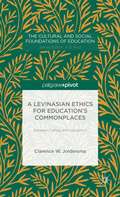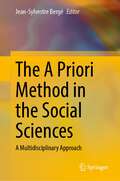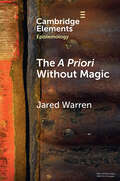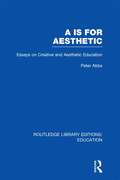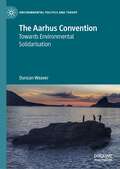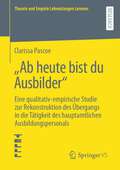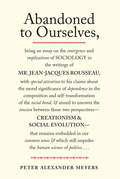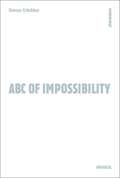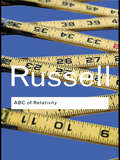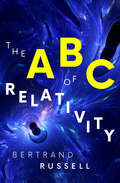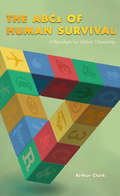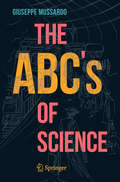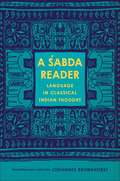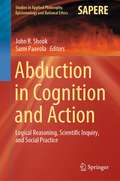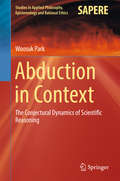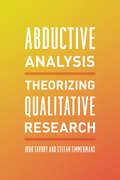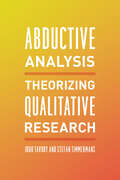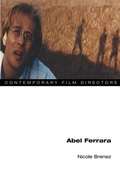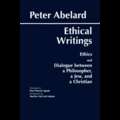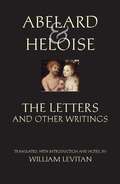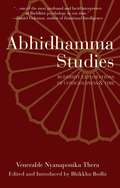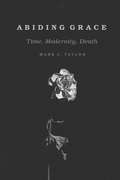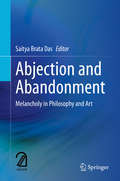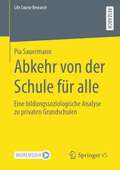- Table View
- List View
A fin de cuentas: Nuevo cuaderno de la vejez
by Aurelio ArtetaAurelio Arteta rescata la vejez del enjambre de prejuicios que suelen desfigurarla. «Solo desde el crepúsculo se adquiere una visión del día completo.» La vejez nos convierte en testigos privilegiados de la vida, por ser la posición idónea, afirma Aurelio Arteta, desde la que evaluar las demás edades. En A fin de cuentas, entabla con el lector una conversación a la que también están invitados Montaigne, Spinoza, Schopenhauer, Leopardi, Saint-Exupéry, De Beauvoir y Canetti, entre otros, al tiempo que rescata la vejez del enjambre de prejuicios que suelen desfigurarla. Este «diario disfrazado» compuesto de sabias meditaciones, citas memorables, recuerdos, escenas de la vida y retratos, puede leerse como un sutil tratado filosófico en fragmentos que nos invita a mirarnos bien adentro y a despojarnos de toda afectación y de la trivialidad en la que tendemos a hundirnos. Con ingenio, serenidad e ironía, capta las contrariedades, la dureza, los reveses, pero también las delicias y el humor de la vejez. Lo que brilla a través de estas páginas al tiempo graves y luminosas es un profundo amor a la vida, el rechazo de la muerte -también su acogida- y la enérgica juventud que caracteriza a algunos mayores. También, la nostalgia que tanta lucidez conlleva. La crítica ha dicho...«Uno diría que, de no ser por ese angustioso telón de fondo, en la sociedad actual la vejez ofrece razonables placeres y alegrías bien pautadas, dentro del plazo limitado.»Carlos García Gual, sobre A pesar de los pesares
a levinasian ethics for education’s commonplaces: between calling and inspiration
by To John NickJoldersma applies Levinas's ethics systematically to the commonplaces of education - teaching, learning, curriculum, and institutions - and elucidates the role of justice and responsibility and the meaning of calling and inspiration in education.
The A Priori Method in the Social Sciences: A Multidisciplinary Approach
by Jean-Sylvestre BergéThis edited volume takes a multidisciplinary look at the philosophical concept of a priori. Placing social sciences at the heart of the discussion, this book establishes a dialogue between various disciplines and the different postulates, presuppositions, prejudices, paradigms, beliefs, commonplaces, biases or emotions that forge their theoretical and practical constructs. The book is divided into three parts. Chapters in Part I lay the foundations of a new antecedent approach that revisits the classical approach to a priori and its relationships with law and philosophy. Chapters in Part II extend the analysis to economics and management, on such key topics as blockchain technology, labor, health insurance and innovation. Finally, chapters in Part III turn to anthropology and sociology, to reconsider the core methods of these different disciplines and to nourish reflection on the basis of new working hypotheses.
The A Priori Without Magic (Elements in Epistemology)
by Jared WarrenThe distinction between the a priori and the a posteriori is an old and influential one. But both the distinction itself and the crucial notion of a priori knowledge face powerful philosophical challenges. Many philosophers worry that accepting the a priori is tantamount to accepting epistemic magic. In contrast, this Element argues that the a priori can be formulated clearly, made respectable, and used to do important epistemological work. The author's conception of the a priori and its role falls short of what some historical proponents of the notion may have hoped for, but it allows us to accept and use the notion without abandoning either naturalism or empiricism, broadly understood. This Element argues that we can accept and use the a priori without magic.
Aa is for Aesthetic: Essays on Creative and Aesthetic Education (Routledge Library Editions: Education)
by Peter AbbsThis volume reaffirms the indispensable place of the arts in any coherent curriculum. The author hopes that the specific arguments formulated in the book will advance the conservationist post-Modernist aesthetic.
The Aarhus Convention: Towards Environmental Solidarisation (Environmental Politics and Theory)
by Duncan WeaverThe Aarhus Convention on access to information, public participation in decision-making and access to justice in environmental matters has been celebrated as a pioneering international environmental agreement. Given that a quarter-century has passed since Aarhus was opened for signature, now is an opportune moment to revisit it from a fresh perspective. Marking this anniversary, this book explores Aarhus from the vista of the English School of International Relations, an ethically-minded perspective used to gauge the prevalence of state-oriented and human-oriented progress from the Convention's rationales and realities. It firstly considers Aarhus' propagation, investigating the legal, diplomatic and geopolitical contexts enabling its emergence. It secondly investigates Aarhus' germination, with reference to its trinity of procedural rights. Thirdly, the book examines the Convention's growth, in terms of the development of its organisational infrastructure. The chief finding is that Aarhus demonstrates, in environmental contexts, the feasibility and benefit of fostering 'humankind' solidarist progress, rooted in moral cosmopolitanism, within the existing power arrangements of a sovereignty-based pluralism. Pluralist concerns for diversity and international order are found to be a precondition for more ethically ambitious solidarist endeavours. These observations reinforce the logic of solidarisation, an English School innovation that presents sovereignty as (a) being ethically matured by solidarism whilst (b) delimiting solidarism within the threshold of states' tolerance.
„Ab heute bist du Ausbilder“: Eine qualitativ-empirische Studie zur Rekonstruktion des Übergangs in die Tätigkeit des hauptamtlichen Ausbildungspersonals (Theorie und Empirie Lebenslangen Lernens)
by Clarissa PascoeIn diesem Buch wird der Übergang aus einer Tätigkeit als gewerblich-technische Fachkraft in die hauptamtliche Ausbildungsfunktion in einer betrieblichen Ausbildungswerkstatt untersucht. In einem fallrekonstruktiven Forschungsansatz wird das Erleben und Bewältigen von typischen Herausforderungen während und infolge dieses Übergangs nachgezeichnet. Hierzu wurden hauptamtliche Ausbilder*innen in den industriellen Metall- und Elektroberufen zu ihren Übergangserfahrungen befragt. Ergebnis ist eine empirisch fundierte Beschreibung von fünf typischen Entwicklungsaufgaben, mit denen Ausbilder*innen während und infolge des Übergangs konfrontiert werden und die sie in Abhängigkeit von subjektiven Ressourcen und Orientierungen unterschiedlich deuten und bearbeiten. Die Fallrekonstruktion führt zu vier Typen von Bewältigungsstrategien, die sich hinsichtlich ihres Umgangs mit Erfahrungswissen, ihrer pädagogischen Überzeugungen sowie ihres Reflexionswissens unterscheiden. Darauf aufbauend wird mit Hilfe des Sozialweltkonzeptes die Frage nach der Rolle und Funktion einer übergeordneten kollegialen Bezugsgemeinschaft als potentielle Wissens- und Kompetenzgrundlage der Akteure der beruflich-betrieblichen Bildung vor dem Hintergrund der strukturellen Rahmenbedingungen und Systemspezifika diskutiert.
Abandoned to Ourselves
by Peter Alexander MeyersIn this extraordinary work, Peter Alexander Meyers shows how the centerpiece of the Enlightenment--society as the symbol of collective human life and as the fundamental domain of human practice--was primarily composed and animated by its most ambivalent figure: Jean-Jacques Rousseau. Displaying this new society as an evolving field of interdependence, Abandoned to Ourselves traces the emergence and moral significance of dependence itself within Rousseau's encounters with a variety of discourses of order, including theology, natural philosophy, and music. Underpinning this whole scene we discover a modernizing conception of the human Will, one that runs far deeper than Rousseau's most famous trope, the "general Will." As Abandoned to Ourselves weaves together historical acuity with theoretical insight, readers will find here elements for a reconstructed sociology inclusive of things and persons and, as a consequence, a new foundation for contemporary political theory.
ABC of Impossibility
by Simon CritchleyHow does one write an experimental ABC, an impossible theory that would deal with a series of phenomena, concepts, places, sensations, persons, and moods? A para-philosophy? Returning to a once-abandoned project of fragmented thoughts where the author's voice moves from the serious to the pathetic, to the absurd, to the cynical, Simon Critchley's ABC of Impossibility finds new life in the form of this small encyclopedic and aphoristic text where the reader bears witness to the slow emergence of an attempt at a poetic ontology. ABC of Impossibility is a unique undertaking that reexamines the poetic site of the fragment as thought. Following a heritage of fragmented, aphoristic thinkers including Pascal, Nietzsche, Kierkegaard, and Pessoa, Critchley revitalizes a para-philosophical thinking that can only be uttered by way of another. As he declares in the opening pages, "In writing this, I promise to tell the truth, but not to be myself."
ABC of Relativity
by Bertrand RussellFirst published in 1925, Bertrand Russell’s ABC of Relativity was considered a masterwork of its time, contributing significantly to the mass popularisation of science. Authoritative and accessible, it provides a remarkable introductory guide to Einstein’s theory of Relativity to a general readership. One of the most definitive reference guides of its kind, and written by one of the twentieth century’s most influential philosophers, ABC of Relativity continues to be as relevant today as it was on first publication.
The ABC of Relativity (Routledge Classics Ser.)
by Bertrand RussellThe Nobel Prize winner offers &“an ideal introduction to the theories of special and general relativity&” in clear, comprehensible language(Nature). A renowned mathematician and philosopher, and as well as recipient of the Nobel Prize in Literature, Bertrand Russell was acclaimed for his ability to address complex subjects in accessible ways. In this classic reference book, Russell delves into physics and relativity, helping everyday readers grasp the genius and implications of Albert Einstein&’s theory. When originally published in 1925, The ABC of Relativity brought science to a more general audience—and it continues to do so in the twenty-first century. &“A mind of dazzling brilliance.&” —The New York Times
The ABCs of Human Survival
by Arthur ClarkThe ABCs of Human Survival examines the effect of militant nationalism and the lawlessness of powerful states on the well-being of individuals and local communities?and the essential role of global citizenship within that dynamic. Based on the analysis of world events, Dr. Arthur Clark presents militant nationalism as a pathological pattern of thinking that threatens our security, while emphasizing effective democracy and international law as indispensable frameworks for human protection. Within the contexts of history, sociology, philosophy, and spirituality, The ABCs of Human Survival calls into question the assumptions of consumer culture and offers, as an alternative, strategies to improve overall well-being through the important choices we make as individuals.
The ABC’s of Science
by Giuseppe MussardoScience, with its inherent tension between the known and the unknown, is an inexhaustible mine of great stories. Collected here are twenty-six among the most enchanting tales, one for each letter of the alphabet: the main characters are scientists of the highest caliber most of whom, however, are unknown to the general public.This book goes from A to Z. The letter A stands for Abel, the great Norwegian mathematician, here involved in an elliptic thriller about a fundamental theorem of mathematics, while the letter Z refers to Absolute Zero, the ultimate and lowest temperature limit, - 273,15 degrees Celsius, a value that is tremendously cooler than the most remote corner of the Universe: the race to reach this final outpost of coldness is not yet complete, but, similarly to the history books of polar explorations at the beginning of the 20th century, its pages record successes, failures, fierce rivalries and tragic desperations. In between the A and the Z, the other letters of the alphabet are similar to the various stages of a very fascinating journey along the paths of science, a journey in the company of a very unique set of characters as eccentric and peculiar as those in Ulysses by James Joyce: the French astronomer who lost everything, even his mind, to chase the transits of Venus; the caustic Austrian scientist who, perfectly at ease with both the laws of psychoanalysis and quantum mechanics, revealed the hidden secrets of dreams and the periodic table of chemical elements; the young Indian astrophysicist who was the first to understand how a star dies, suffering the ferocious opposition of his mentor for this discovery. Or the Hungarian physicist who struggled with his melancholy in the shadows of the desert of Los Alamos; or the French scholar who was forced to hide her femininity behind a false identity so as to publish fundamental theorems on prime numbers. And so on and so forth.Twenty-six stories, which reveal the most authentic atmosphere of science and the lives of some of its main players: each story can be read in quite a short period of time -- basically the time it takes to get on and off the train between two metro stations. Largely independent from one another, these twenty-six stories make the book a harmonious polyphony of several voices: the reader can invent his/her own very personal order for the chapters simply by ordering the sequence of letters differently. For an elementary law of Mathematics, this can give rise to an astronomically large number of possible books -- all the same, but - then again - all different. This book is therefore the ideal companion for an infinite number of real or metaphoric journeys.
A Śabda Reader: Language in Classical Indian Thought (Historical Sourcebooks in Classical Indian Thought)
by Johannes BronkhorstLanguage (śabda) occupied a central yet often unacknowledged place in classical Indian philosophical thought. Foundational thinkers considered topics such as the nature of language, its relationship to reality, the nature and existence of linguistic units and their capacity to convey meaning, and the role of language in the interpretation of sacred writings. The first reader on language in—and the language of—classical Indian philosophy, A Śabda Reader offers a comprehensive and pedagogically valuable treatment of this topic and its importance to Indian philosophical thought.A Śabda Reader brings together newly translated passages by authors from a variety of traditions—Brahmin, Buddhist, Jaina—representing a number of schools of thought. It illuminates issues such as how Brahmanical thinkers understood the Veda and conceived of Sanskrit; how Buddhist thinkers came to assign importance to language’s link to phenomenal reality; how Jains saw language as strictly material; the possibility of self-contradictory sentences; and how words affect thought. Throughout, the volume shows that linguistic presuppositions and implicit notions about language often play as significant a role as explicit ideas and formal theories. Including an introduction that places the texts and ideas in their historical and cultural context, A Śabda Reader sheds light on a crucial aspect of classical Indian thought and in so doing deepens our understanding of the philosophy of language.
Abduction in Cognition and Action: Logical Reasoning, Scientific Inquiry, and Social Practice (Studies in Applied Philosophy, Epistemology and Rational Ethics #59)
by John R. Shook Sami PaavolaThis book gathers together novel essays on the state-of-the-art research into the logic and practice of abduction. In many ways, abduction has become established and essential to several fields, such as logic, cognitive science, artificial intelligence, philosophy of science, and methodology. In recent years this interest in abduction’s many aspects and functions has accelerated. There are evidently several different interpretations and uses for abduction. Many fundamental questions on abduction remain open. How is abduction manifested in human cognition and intelligence? What kinds or types of abduction can be discerned? What is the role for abduction in inquiry and mathematical discovery? The chapters aim at providing answer to these and other current questions. Their contributors have been at the forefront of discussions on abduction, and offer here their updated approaches to the issues that they consider central to abduction’s contemporary relevance. The book is an essential reading for any scholar or professional keeping up with disciplines impacted by the study of abductive reasoning, and its novel development and applications in various fields.
Abduction in Context: The Conjectural Dynamics of Scientific Reasoning (Studies in Applied Philosophy, Epistemology and Rational Ethics #32)
by Woosuk ParkThis book provides readers with a novel perspective on abduction. It starts by discussing the major theories of abduction, with emphasis on the hybrid nature of abduction as both inference and intuition. It reports on the Peircean theory of abduction and discusses the more recent Magnani's concept on animal abduction, connecting them to the work of medieval philosophers. Building on Magnani's manipulative abduction, the accompanying classification of abduction, and the hybrid conception of abduction as both inference and intuition, the book then examines the problem of visual perception, as it has been tackled by the author, together with the related concepts of misrepresentation and semantic information. It presents the author's views on caricature and the caricature model of science, and extend then the scope of discussion by introducing some standard issues in philosophy of science. By discussing the concept of ad hoc hypothesis generation as enthymeme resolution, the book demonstrates how ubiquitous the problem of abduction is in all different individual scientific disciplines. All in all, the book is a comprehensive text, providing philosophers, logicians and cognitive scientists with a historical, unified and authoritative perspective on abduction.
Abductive Analysis: Theorizing Qualitative Research
by Iddo Tavory Stefan TimmermansIn Abductive Analysis, Iddo Tavory and Stefan Timmermans provide a new navigational map for theorizing qualitative research. They outline a way to think about observations, methods, and theories that nurtures theory formation without locking it into predefined conceptual boxes. The book provides novel ways to approach the challenges that plague qualitative researchers across the social sciences--how to conceptualize causality, how to manage the variation of observations, and how to leverage the researcher’s community of inquiry. Abductive Analysis is a landmark work that shows how a pragmatist approach provides a productive and fruitful way to conduct qualitative research.
Abductive Analysis: Theorizing Qualitative Research
by Iddo Tavory Stefan TimmermansIn Abductive Analysis, Iddo Tavory and Stefan Timmermans provide a new navigational map for theorizing qualitative research. They outline a way to think about observations, methods, and theories that nurtures theory formation without locking it into predefined conceptual boxes. The book provides novel ways to approach the challenges that plague qualitative researchers across the social sciences—how to conceptualize causality, how to manage the variation of observations, and how to leverage the researcher’s community of inquiry. Abductive Analysis is a landmark work that shows how a pragmatist approach provides a productive and fruitful way to conduct qualitative research.
Abel Ferrara (Contemporary Film Directors)
by Nicole Brenez Adrian MartinIn this concise study, Nicole Brenez argues for Abel Ferrara's place in a line of grand inventors who have blurred distinctions between industry and avant-garde film, including Orson Welles, Monte Hellman, and Nicholas Ray. Rather than merely reworking genre film, Brenez understands Ferrara's oeuvre as formulating new archetypes that depict the evil of the modern world. Focusing as much on the human figure as on elements of storytelling, she argues that films such as Bad Lieutenant express this evil through visionary characters struggling against the inadmissible (inadmissible behavior, morality, images, and narratives).
Abelard: Ethical Writings
by Paul V. Spade Marilyn Mccord Adams Peter AbelardAbelard's major ethical writings--Ethics, or Know Yourself, and Dialogue between a Philosopher, a Jew and a Christian, are presented here in a student edition including cross-references, explanatory notes, a full table of references, bibliography, and index.
Abelard and Heloise: The Letters and Other Writings
by Heloise Stanley Lombardo William Levitan AbelardThe most comprehensive compilation of the works of Abelard and Heloise ever presented in a single volume in English, The Letters and Other Writings features an accurate and stylistically faithful new translation of both The Calamities of Peter Abelard and the remarkable letters it sparked between the ill-fated twelfth-century philosopher and his brilliant former student and lover--an exchange whose intellectual passion, formal virtuosity, and psychological drama distinguish it as one of the most extraordinary correspondences in European history. Thanks to this edition, Latin-less readers will be better placed than ever to see why this undisputed milestone in the intellectual life of medieval France is also a masterpiece of Western literature.In addition to the The Calamities and the letters--the first complete English translation of all seven in more than eighty years--this volume includes an Introduction, a map, and a chronology, Abelard's Confession of Faith, letters between Heloise and Peter the Venerable, the Introduction to The Questions of Heloise, and selected songs and poems by Abelard, among them a previously untranslated shaped poem, Open Wide Your Eyes. Extracts of lost letters sometimes ascribed to Abelard and Heloise are given in appendixes.
Abhidhamma Studies
by Bhikkhu Bodhi Nyanaponika TheraThe Abhidhamma, the third great division of early Buddhist teaching, expounds a revolutionary system of philosophical psychology rooted in the twin Buddhist insights of selflessness and dependent origination. In keeping with the liberative thrust of early Buddhism, this system organizes the entire spectrum of human consciousness around the two poles of Buddhist doctrine - bondage and liberation, Samsara and Nirvana - the starting point and the final goal. It thereby maps out, with remarkable rigour and precision, the inner landscape of the mind to be crossed through the practical work of Buddhist meditation. In this book of groundbreaking essays, Venerable Nyanaponika Thera, one of our age's foremost exponents of Theravada Buddhism, attempts to penetrate beneath the formidable face of the Abhidhamma and to make its principles intelligible to the thoughtful reader of today. His point of focus is the Consciousness Chapter of the Dhammasangani, the first treatise of the Abhidhamma Pitaka. Basing his interpretation on the detailed list of mental factors that the Abhidhamma uses as a guide to psychological analysis, he launches into bold explorations in the multiple dimensions of conditionality, the nature of consciousness, the temporality of experience, and the psychological springs of spiritual transformation. Innovative and rich in insights, this book does not merely open up new avenues in the academic study of early Buddhism. By treating the Abhidhamma as a fountainhead of inspiration for philosophical and psychological inquiry, it demonstrates the continuing relevance of Buddhist thought to our most astute contemporary efforts to understand the elusive yet so intimate nature of the mind.
Abiding Grace: Time, Modernity, Death (Religion and Postmodernism)
by Mark C. TaylorPost-war, post-industrialism, post-religion, post-truth, post-biological, post-human, post-modern. What succeeds the post- age? Mark C. Taylor returns here to some of his central philosophical preoccupations and asks: What comes after the end? Abiding Grace navigates the competing Hegelian and Kierkegaardian trajectories born out of the Reformation and finds Taylor arguing from spaces in between, showing how both narratives have shaped recent philosophy and culture. For Hegel, Luther’s internalization of faith anticipated the modern principle of autonomy, which reached its fullest expression in speculative philosophy. The closure of the Hegelian system still endures in the twenty-first century in consumer society, financial capitalism, and virtual culture. For Kierkegaard, by contrast, Luther’s God remains radically transcendent, while finite human beings and their world remain fully dependent. From this insight, Heidegger and Derrida developed an alternative view of time in which a radically open future breaks into the present to transform the past, demonstrating that, far from autonomous, life is a gift from an Other that can never be known. Offering an alternative genealogy of deconstruction that traces its pedigree back to readings of Paul by way of Luther, Abiding Grace presents a thoroughgoing critique of modernity and postmodernity’s will to power and mastery. In this new philosophical and theological vision, history is not over and the future remains endlessly open.
Abjection and Abandonment: Melancholy in Philosophy and Art
by Saitya Brata DasThis book provides a thorough and insightful examination of melancholy in philosophy and art. Since the advent of “philosophy,” the question of melancholy has been intimately connected with creativity. In addition, melancholy has taken on a new importance in contemporary discourses. Accordingly, this book revisits the fascinating question of how melancholy and creativity are linked in light of contemporary thought, and gathers studies from diverse disciplines, such as aesthetic theories, psychoanalysis, cultural theory, medical studies and sociological studies. All the contributions are trans-disciplinary in nature and will broaden readers’ understanding of various issues stemming from the question of melancholy. This book will be an indispensable read for scholars, researchers and practitioners in psychology, psychoanalysis, philosophy and related fields.
Abkehr von der Schule für alle: Eine bildungssoziologische Analyse zu privaten Grundschulen (Life Course Research)
by Pia SauermannVor dem Hintergrund eines expandierenden Privatschulsektors einerseits und der Konzeption der für allen gemeinsamen Grundschule andererseits untersucht die vorliegende Arbeit, ob private Grundschulen in Deutschland Bildungsungleichheiten verstärken. Betrachtet werden einerseits die Selektivität der Privatschulwahl und andererseits die Effekte, welche der Besuch einer privaten Grundschule auf die Kompetenzentwicklung hat. Beide Aspekte werden auf Basis von Daten des Nationalen Bildungspanels untersucht. Die Befunde weisen darauf hin, dass die Wahl einer privaten Grundschule insbesondere in städtischen Gebieten und in Ostdeutschland vom Bildungsniveau und vom kulturellen Kapital der Eltern abhängt. Wird die soziale Selektivität der Privatschulwahl berücksichtigt, zeigt sich kein Effekt privater Beschulung auf die Entwicklung von Lese- und Mathematikkompetenzen.
